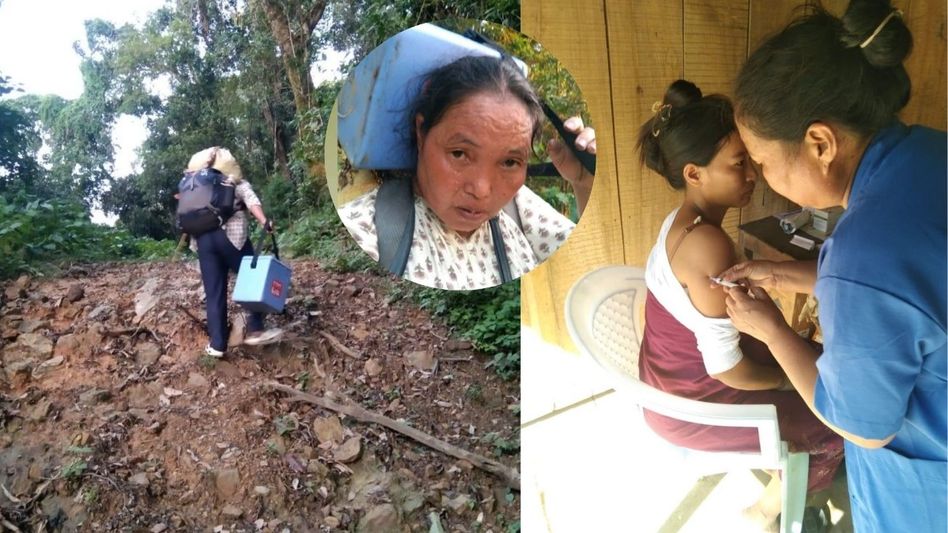Manipur ASHA Worker Treks 8 Hours Through Hills to Deliver Polio Vaccines
In Manipur’s Tamenglong district, 51-year-old ASHA worker Meidinliu Prinmai walked eight hoursover rugged hills to reach remote villages—Attangkhunou and Atangkhullen—to deliver oral polio vaccines as part of the Intensified Pulse Polio Immunization (IPPI) drive. A resident of Atangkhullen (Nenluang) Liangmai, she has served these communities for 13 years. The state launched the Polio Sub-National Immunization Day 2025 targeting over 3.16 lakh children, deploying thousands of health workers and booths. The Manipur Raj Bhavan publicly commended her dedication.
THE HEROINE AND HER TREK: MEIDINLIU PRINMAI’S JOURNEY
Who is she?
• Name & Age: Meidinliu (also spelled Maidiniliu) Prinmai, 51 years old.
• Residence: Atangkhullen (Nenluang) Liangmai, a village in Tamenglong district, Manipur.
• Service record: 13 years as an ASHA (Accredited Social Health Activist). The Raj Bhavan post that lauded her noted “13 years of tireless service.”
What did she do?
As part of the IPPI (Intensified Pulse Polio Immunization) drive, Meidinliu walked through hilly terrain to two isolated villages — Attangkhunou and Atangkhullen — to deliver oral polio vaccines to children aged 0–5. She carried a vaccine carrier on foot, across terrain with no motorable roads.
The terrain is not easy: dense forest paths, uneven slopes often encountered in Tamenglong, and isolated hamlets that are disconnected from regular infrastructure. Reports note the absence of proper motorable roads or consistent power supply in those villages.
The trek reportedly took eight hours in total to reach both villages.
FREQUENTLY ASKED QUESTIONS
Q1: Who is Meidinliu Prinmai and what did she do?
Meidinliu Prinmai is a 51-year-old ASHA worker from Atangkhullen (Nenluang) Liangmai, Tamenglong district, Manipur. She walked eight hours across hills to deliver polio vaccines to isolated villages (Attangkhunou and Atangkhullen) during the IPPI drive.
Q2: Why does ASHA worker have to walk 8 hours — aren’t there roads?
The villages she visited have no motorable roads and lack reliable infrastructure (power, connectivity). Hence, travel on foot through rugged terrain is often the only way to reach remote hamlets.
Q3: What is the IPPI / Polio Immunization campaign being run in Manipur?
It is the Intensified Pulse Polio Immunization (IPPI) drive, part of the Sub-National Immunization Day 2025 in Manipur, targeting children aged 0–5 years. The campaign plans to reach over 3,16,671 children via 3,167 booths, 633 supervisors, and 15,833 vaccine administrators.
Q4: What risks do long treks pose to vaccine delivery?
Long travel can risk cold-chain breaks (vaccine potency), delays, personal fatigue or health hazards for the worker, and logistical mishaps. Ensuring temperature control, efficient routing, and backup plans are essential.
Q5: How can the system better support ASHA workers like Meidinliu?
By improving rural infrastructure (roads, paths), providing better vaccine carriers and cold chain logistics, recruiting more workers to reduce burden, ensuring compensation and gear, building community supports, and investing in mobile health services or innovative delivery (drones, etc.).



